- Home
- Jack Canfield
Chicken Soup for the Nurse's Soul Page 3
Chicken Soup for the Nurse's Soul Read online
Page 3
Emergency-room personnel transported him to the cardiac floor. Long hair, unshaven, dirty, dangerously obese and a black motorcycle jacket tossed on the bottom shelf of the stretcher—an outsider to this sterile world of shining terrazzo floors, efficient uniformed professionals and strict infection-control procedures.
Definitely an untouchable!
The nurses at the station looked wide-eyed as this mound of humanity was wheeled by—each glancing nervously at my friend Bonnie, the head nurse. “Let this one not be mine to admit, bathe and tend to . . . ” was the pleading, unspoken message from their inner concern.
One of the true marks of a leader, a consummate professional, is to do the unthinkable. To touch the untouchable. To tackle the impossible. Yes, it was Bonnie who said, “I want this patient myself.” Highly unusual for a head nurse—unconventional—but “the stuff” out of which human spirits thrive, heal and soar. As she donned her latex gloves and proceeded to bathe this huge, filthy man, her heart almost broke. Where was his family? Who was his mother? What was he like as a little boy?
She hummed quietly as she worked to ease the fear and embarrassment she knew he must have been feeling. And then on a whim she said, “We don’t have time for back rubs much in hospitals these days, but I bet one would really feel good. And, it would help you relax your muscles and start to heal. That is what this place is all about—a place to heal.”
All in a day’s work. Touching the untouchable.
His thick, scaly, ruddy skin told a story of an abusive lifestyle. Probably lots of addictive behavior, to food, alcohol and drugs. As Bonnie rubbed the taut muscles, she hummed and prayed. Prayed for the soul of a little boy grown up, rejected by life’s rudeness and striving for acceptance in a hard, hostile world.
The finale—warmed lotion and baby powder. Almost laughable—such a contrast on this huge, rugged surface. As he rolled over onto his back, tears rolled down his cheek. With amazingly beautiful brown eyes, he smiled and said in a quivering voice, “No one has touched me for years.” His chin trembled. “Thank you. I am healing.”
In a day when we have increasing concern about the appropriateness of touch, Bonnie taught this hurting world to still dare to touch the untouchable through eye contact, a warm handshake, a concerned voice—or the physical reassurance of warmed lotion and baby powder.
Naomi Rhode
Previously appeared in Chicken Soup for the Soul at Work
Jack
After working many years in a large metropolitan hospital, with state-of-the-art conveniences, my work as P.M. charge nurse in a small, local convalescent hospital yielded many frustrations. Occasionally, we lacked supplies or equipment, and sometimes the food was less than desirable. The biggest problem was the lack of qualified help. Still, everyone working there genuinely loved the patients and did their best to care for them.
Alice, a tiny, alert, elderly lady with bright blue, twinkling eyes was everyone’s favorite. Her only living relative was her son Jack, a large, tough man. Tattoos covered his arms and a scraggly beard grew haphazardly on his chin. No matter how cold the weather was, he always wore a tank-top shirt so the dragon and snake artwork could be admired by all. He wore faded jeans, so stiff with grime, they could have stood alone. His loud and gruff manner terrified most of the staff.
But this monstrous man loved his tiny mother. Every day, he roared up to the hospital entrance on his old motorcycle, flung open the front door and tromped down the hall to her room, his clacking boot heels loudly announcing his arrival. He visited at unpredictable hours so he could surprise anyone he suspected of not taking proper care of his mother. Yet, his gentleness with her amazed me.
I made friends with Jack, figuring I’d rather be a friend with a man like him, than an enemy. And I, like everyone else, truly loved his mother.
One particularly bad evening, three aides called in sick, the food carts were late and cold, and one of the patients fell and broke his hip. Jack came in at suppertime to help his mother with her meal. He stood gawking at me in the nurses’ station as I busily tried to do the work of three nurses. Overwhelmed and near tears, I avoided his stare.
After the patients were finally fed, bathed and put to bed, I sat at the desk and put my head down on my arms for a few moments’ relaxation before the night shift arrived. Suddenly, the front door burst open. Startled, I thought, Oh, no! Here comes Jack, checking up on us again! As he stomped to the desk, I looked up to see his burly hand gripping a pickle jar with a bit of colored yarn tied in a bow around the neck. And in the jar was the loveliest, long-stemmed red rose I’d ever seen. Jack handed it to me and said, “I noticed what a bad time you were having tonight. This is for you, from me and my mother.”
With that, he turned around, marched back out the door, and with a roar from his motorcycle, rode out into the darkness.
I’ve received many gifts and cards from many grateful patients and their families, but never one that touched me more than the red rose in the pickle jar given to me that night so long ago.
Kathryn Kimzey Judkins
Olivia
There is no fear in love, but perfect love casts out fear.
John 4:18
“Please drink,” De Lewis coaxed, holding an eyedropper of water to the tiny infant’s parched lips. The four-month-old Haitian baby was badly dehydrated and malnourished. She also had pneumonia and a raging stomach virus.
Cuddling the listless infant in her arms, De remembered a seven-year-old girl from North Carolina who once told her mom and dad, “When I grow up, I want to go to a poor country and help care for sick children.” Well, here she was in Haiti, where the conditions were ten times worse than she ever dreamed possible. What De never once dreamed, however, was that her very first day in Haiti she would fall hopelessly, helplessly, head-over-heels in love with a sick baby girl named Olivia.
After her divorce in 1994, De had moved to Anchorage, Alaska, where there was a call for her skills as a pediatric physical therapist. She joined a local church, and in September of 1995, De left her patients in a colleague’s able care and volunteered for three months of mission work in a Haitian orphanage.
De cried when she reached Port-au-Prince and saw thousands of hungry Haitians teeming in the streets, smoldering piles of garbage everywhere and not a tree in sight. The walled orphanage seemed like a tranquil oasis.
Still, there was never enough food or money to buy medicines for the dozens of sick children who lived there.
Olivia was to be the very first Haitian infant De held in her arms.
“A bread vendor found her abandoned in the street only hours after she was born,” the orphanage director explained. “She’s very sick. We’ve done all we can with our limited resources.”
De couldn’t put Olivia down. The moment their eyes locked she’d felt an inexplicable bond with this tiny baby who was so weak she could hardly move her head.
Over the next several days, De pitched right in and helped change diapers and administer medicines to the orphanage children. But whenever she had a spare moment, she always hurried to Olivia’s side. De carried the infant to see the doctor every morning, and every night she slept holding Olivia in her arms. “Why, of all these sick children, do I love this baby so much?” she wondered, but De knew it was a question only God could answer.
De’s itinerary called for her to spend just a few days in Port-au-Prince before moving on to another orphanage in the remote Haitian countryside. Because of Olivia she delayed her departure for several weeks, and then one night she told the orphanage director, “I’m not going at all unless I can take Olivia with me.”
Tears spilled down the director’s cheeks. “You really love that baby, don’t you?”
“Yes, I do,” De replied.
At the smaller, remote orphanage, De used an old towel to make a sling and carried Olivia snuggled against her chest wherever she went. On those rare occasions when she did put her down, even for a moment, Olivia flailed her arms and cried unt
il De picked her up again. “You’re getting so strong and healthy,” De marveled when she heard Olivia’s lusty cries.
When the other children called her “Olivia’s Mama,” De began dreaming of adopting Olivia and taking her home to Alaska. She tried to initiate adoption proceedings, but was thwarted at every turn. Rocking Olivia in her arms, she lamented, “Maybe it’s not meant to be.”
De extended her stay in Haiti until the beginning of February to be with Olivia, but finally she knew it was time to return to the many sick children in Alaska who also needed her care. Before she left, she carried Olivia back to the main orphanage in Port-au-Prince and implored newly-arriving missionaries, “Please take special care of Olivia, and show her to anyone who comes looking for a sweet baby to adopt. If I can’t adopt her, I want more than anything for her to find a loving home.”
De sat up the whole night before she left, cuddling Olivia. “Will I ever see you again?” she wondered. “Please God, keep this precious child healthy and safe.”
Back in Anchorage, De ran up huge phone bills calling the orphanage every other day to ask about Olivia. “She’s doing wonderfully,” reported the orphanage workers who all knew how much De worried about Olivia.
Then, one morning at 4:00 A.M., De awoke shouting, “Olivia!”
Somehow she knew she had to call right away.
It was four hours later in Haiti. The woman who answered the phone was a stranger to De. When De asked about Olivia the woman said, “Oh, that poor baby is so sad. Ever since her American mama left, she just cries and cries.”
“I’m Olivia’s mama!” she sobbed into the phone. “Tell my baby I’m coming back for her. Tell her if they won’t let me adopt her, I’ll move to Haiti to live.”
De called the adoption agency only to receive more devastating news. A family from British Columbia had already expressed interest in adopting Olivia.
De felt torn in two. More than anything she wanted to adopt Olivia herself. “But what if that isn’t what God intended?” she asked her own mother over the phone. “What if God only meant for me to take good care of Olivia until the family she was meant to be with could find her?”
De prayed for a sign from God, and that Sunday she got one.
It was Mother’s Day, and during the service the pastor presented heart pins to all of the congregation’s moms. Then he walked straight to De and handed her a pin, too. “This is for Olivia’s mother,” he announced.
De burst into tears. She knew exactly what she had to do.
Soon she was back in Port-au-Prince. At the orphanage, all of the children gathered around cheering, “Mama Olivia! Olivia’s mother is here!”
Inside, De barely recognized little Olivia. She had nearly stopped eating, and her hair had turned red from lack of protein.
De sobbed over the tiny crib. “Olivia, it’s me—your mama.” Slowly, Olivia opened her brown eyes. And then she smiled.
De lifted Olivia into her arms and hugged her. “First, I’m going to get you well again,” she vowed. “Then I’m going to take you home with me to Alaska.”
This time the red tape practically cut itself. Olivia’s adoption was quickly approved, and in less than six weeks De was back in Alaska with her brand-new daughter.
Today, Olivia is a happy, healthy little girl who loves hiking and camping with her mom in the scenic Alaskan wilderness. In their cozy home, she carries her toys and picture books to De and snuggles in her arms while her mama reads to her. Wherever De goes, Olivia is sure to be close behind. Her wide brown eyes follow De’s every movement as if to say, “I lost you once. I’m never going to lose you again.”
It’s a sentiment her mama shares with all her heart.
Heather Black
A Matter of Believing
There is something in the nature of things which the mind of man, which reason, which human power cannot effect, and certainly that which produces this must be better than man. What can this be but God.
Cicero
The school bell rang loud and clear at the elementary school. Amidst much shouting and laughing, the children raced out the door for summer vacation. Johnny raced through the crowd to his bike, hopped on and headed home.
From nowhere, a car careened into him, knocking him off the bike and into the street, unconscious. The paramedics arrived and rushed him to the hospital, where doctors whispered behind closed doors and shook their heads solemnly. They had little hope the ten-year-old boy would make it.
News of the accident spread quickly. Teachers, friends and relatives came to the hospital to see their beloved Johnny and to pray and wait. He was conscious, but couldn’t walk or talk. Johnny’s mom stayed by his side day and night, praying and holding his little hand.
Slowly, he began to recover, trying to form words and even sitting up in bed. A nurse named Julie came by often to check on him and give him candy. But the doctors still doubted he would ever walk again.
Late one evening, Nurse Julie stopped in Johnny’s room. She found him struggling to get out of bed. She rushed to help him, and soon Johnny’s feet were on the floor. Julie looked him square in the eyes and said, “It’s time for you to walk.”
He took one step and stumbled. Julie reassured him: “Have faith, I’m here to help you. Believe you can do it, and you will.” A few more steps led to a few more steps, and Johnny was walking. It was a miracle!
Johnny was standing by the window when his doctor came in. “How did you get over to the window?” he asked.
“Nurse Julie helped me,” Johnny answered.
The doctor looked puzzled. “Who helped you?”
“Julie. She said all I had to do was believe, and I would walk again.”
The doctor walked out of the room, mystified. There was no nurse named Julie. A thought crossed his mind. He shook it off. “No, I don’t believe in angels.” And he continued down the hall.
But it still puzzled him. He finally asked Johnny what the nurse looked like. From this description, he talked to the nurses, and learned that a nurse named Julie did work there—twenty-five years ago. After a bad accident she, also, was told she would never walk again. A few hours later, Julie died of heart failure.
The doctor talked with Johnny’s parents, explaining the history of Nurse Julie. Johnny’s mother smiled and said matter-of-factly, “Well, if God sent one of his angels, that’s fine with me.”
I met him at a charity bike-a-thon. After sharing his story with me, his faced beamed. “Today, I’m flying high because an angel of God touched me.” I watched him ride, his muscles straining with the effort and his T-shirt blowing in the wind. He was on a bike again and truly flying high.
Scot Thurman
Wake Up!
Next to a good soul-stirring prayer is a good laugh.
Samuel Mutchmore
Of Midwestern blood, I was schooled as a registered nurse in Fargo, North Dakota. Three years into my working career, my husband and I packed our few belongings and moved south to Fort Worth, Texas.
My initial job was in a Post-Anesthesia Surgical Care Unit. It was an exciting change from my neuro-orthopedic experience, and my clinical skills adapted smoothly. Despite this blanket of comfort, there existed a neoteric aspect of patient care that Fargo had not prepared me for.
Fort Worth was largely populated by persons of Hispanic descent. Fargo was not. In Fargo, the Norwegian dialect asks, “How ya doin’?” Whereas, in Fort Worth you hear, “Como esta?” And, the days of “Uf da” were now but a dear sweet memory. Soon, my fingertips scrambled through the pages of the Spanish-English dictionary close at hand in my locker. Fortunately, many of my nursing colleagues were already armored with conversational Spanish—at least enough to manage a patient through the recovery-room process. I was assured that I, too, would soon gain such competency.
One afternoon, Mr. Mendoza was wheeled into recovery, still lightly anesthetized. I was given the report: “Fifty-one-year-old Hispanic male, married wife out in the waiting area, non-English s
peaking . . . right inguinal hernia . . . general anesthesia . . . extubated without difficulty. . . . ”
I engaged myself in the care of my new patient, dressing Mr. Mendoza in the standard patient attire of EKG, blood pressure and oxygen monitors. His physical assessments were normal: vital signs checked out normal sinus rhythm; blood pressure stable; respirations nonlabored; breath sounds clear; oxygen saturation at 99 percent; good capillary refill in all four extremities; abdomen soft, with bowel sounds present; surgical dressing was clean and dry.
But his neurological status remained in question: “Mr. Mendoza, Mr. Mendoza.” Not a stir. Not a flinch of a response to my voice or to touch.
His wife came in to see him. Mr. Mendoza didn’t respond to her either. I continued closely monitoring my sleeping patient, charting, “clinically stable, assessment unchanged . . . remains nonresponsive to voice or touch at this time. . . .” Definitely, it was not prudent to chart, “Responds like a brick wall.” I continued to engage every effort to waken him.
“Mr. Mendoza, Mr. Mendoza,” I called over and over again. Soon I had an uncomfortable sense of an audience.
The other half-dozen or so semi-conscious patients and their nurses were clearly annoyed with the echo of my persistent badgering.
Yet, I was determined to get any elicited response—a groan, a hand squeeze, a bat of an eye. Art, my trusted and bilingual colleague, finally came to my aid. He suggested I ask Mr. Mendoza to “wake up” in Spanish. I nodded my head as Art repeated the Spanish phrase I was to repeat to my patient. Art assured me it would elicit a response.
Trusting my rescuer, I didn’t question Art for the English translation of his tutorial. As I repeated it in my head, I was comforted by the cohesive support I felt from the other patients and staff looking on with eager anticipation. I assumed they sensed the emergent need for Mr. Mendoza to respond, lest he fail his neurological assessment.

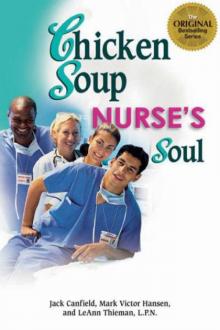 Chicken Soup for the Nurse's Soul: Second Dose
Chicken Soup for the Nurse's Soul: Second Dose Chicken Soup for the Ocean Lover's Soul
Chicken Soup for the Ocean Lover's Soul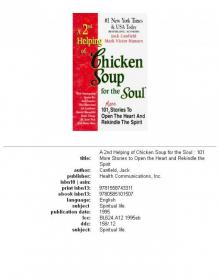 A 2nd Helping of Chicken Soup for the Soul
A 2nd Helping of Chicken Soup for the Soul Chicken Soup for the Nurse's Soul
Chicken Soup for the Nurse's Soul Chicken Soup for the Breast Cancer Survivor's Soul
Chicken Soup for the Breast Cancer Survivor's Soul Chicken Soup for the Pet Lover's Soul
Chicken Soup for the Pet Lover's Soul Chicken Soup for the Bride's Soul
Chicken Soup for the Bride's Soul A Chicken Soup for the Soul Christmas
A Chicken Soup for the Soul Christmas Chicken Soup for the Soul of America
Chicken Soup for the Soul of America Chicken Soup for the Teenage Soul on Tough Stuff
Chicken Soup for the Teenage Soul on Tough Stuff A Taste of Chicken Soup for the Teenage Soul III
A Taste of Chicken Soup for the Teenage Soul III Chicken Soup for Every Mom's Soul
Chicken Soup for Every Mom's Soul Chicken Soup for the Dog Lover's Soul
Chicken Soup for the Dog Lover's Soul A Second Chicken Soup for the Woman's Soul
A Second Chicken Soup for the Woman's Soul Chicken Soup for the Soul the Book of Christmas Virtues
Chicken Soup for the Soul the Book of Christmas Virtues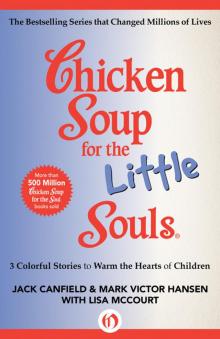 Chicken Soup for the Little Souls: 3 Colorful Stories to Warm the Hearts of Children
Chicken Soup for the Little Souls: 3 Colorful Stories to Warm the Hearts of Children Chicken Soup for the African American Woman's Soul
Chicken Soup for the African American Woman's Soul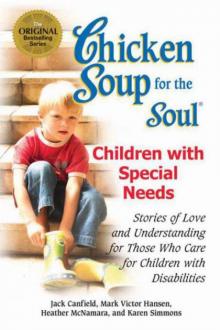 Chicken Soup for the Soul
Chicken Soup for the Soul Chicken Soup for the Soul Celebrates Teachers
Chicken Soup for the Soul Celebrates Teachers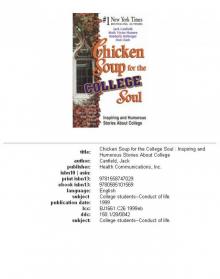 Chicken Soup for the College Soul
Chicken Soup for the College Soul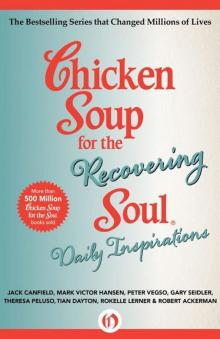 Chicken Soup for the Recovering Soul Daily Inspirations
Chicken Soup for the Recovering Soul Daily Inspirations Chicken Soup for the Soul Celebrates Sisters
Chicken Soup for the Soul Celebrates Sisters Chicken Soup for the Dieter's Soul
Chicken Soup for the Dieter's Soul Chicken Soup for the Soul at Work 101 Stories of Courage
Chicken Soup for the Soul at Work 101 Stories of Courage Chicken Soup for the Beach Lover's Soul
Chicken Soup for the Beach Lover's Soul Stories About Facing Challenges, Realizing Dreams and Making a Difference
Stories About Facing Challenges, Realizing Dreams and Making a Difference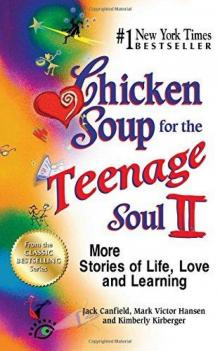 Chicken Soup for the Teenage Soul II
Chicken Soup for the Teenage Soul II Chicken Soup for the Girl's Soul
Chicken Soup for the Girl's Soul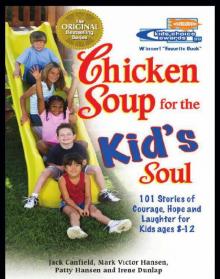 Chicken Soup for the Kid's Soul: 101 Stories of Courage, Hope and Laughter
Chicken Soup for the Kid's Soul: 101 Stories of Courage, Hope and Laughter Chicken Soup for the Woman's Soul
Chicken Soup for the Woman's Soul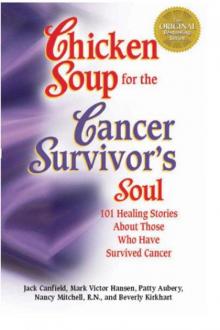 Chicken Soup for the Cancer Survivor's Soul
Chicken Soup for the Cancer Survivor's Soul Chicken Soup for the Canadian Soul
Chicken Soup for the Canadian Soul Chicken Soup for the Military Wife's Soul
Chicken Soup for the Military Wife's Soul A 4th Course of Chicken Soup for the Soul
A 4th Course of Chicken Soup for the Soul Chicken Soup Unsinkable Soul
Chicken Soup Unsinkable Soul Chicken Soup for the Soul: Christmas Magic
Chicken Soup for the Soul: Christmas Magic Chicken Soup for the Grandma's Soul
Chicken Soup for the Grandma's Soul Chicken Soup for the Soul: All Your Favorite Original Stories
Chicken Soup for the Soul: All Your Favorite Original Stories Chicken Soup for the Expectant Mother's Soul
Chicken Soup for the Expectant Mother's Soul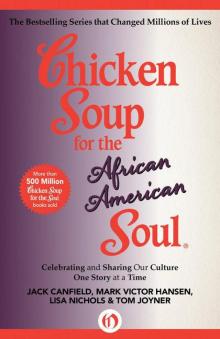 Chicken Soup for the African American Soul
Chicken Soup for the African American Soul 101 Stories of Changes, Choices and Growing Up for Kids Ages 9-13
101 Stories of Changes, Choices and Growing Up for Kids Ages 9-13 Christmas Magic
Christmas Magic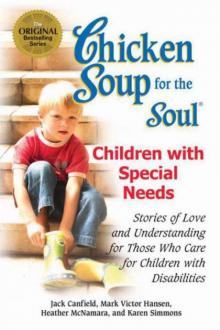 Chicken Soup for the Soul: Children with Special Needs
Chicken Soup for the Soul: Children with Special Needs Chicken Soup for the Soul: Country Music: The Inspirational Stories behind 101 of Your Favorite Country Songs
Chicken Soup for the Soul: Country Music: The Inspirational Stories behind 101 of Your Favorite Country Songs Chicken Soup for the Country Soul
Chicken Soup for the Country Soul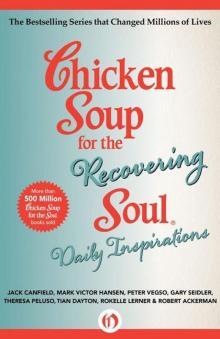 Chicken Soup for the Recovering Soul Daily Inspirations (Chicken Soup for the Soul)
Chicken Soup for the Recovering Soul Daily Inspirations (Chicken Soup for the Soul) A 3rd Serving of Chicken Soup for the Soul
A 3rd Serving of Chicken Soup for the Soul The Book of Christmas Virtues
The Book of Christmas Virtues Chicken Soup for the Soul at Work
Chicken Soup for the Soul at Work Chicken Soup for the Soul 20th Anniversary Edition
Chicken Soup for the Soul 20th Anniversary Edition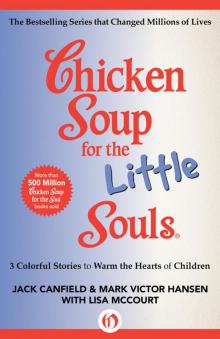 Chicken Soup for the Little Souls
Chicken Soup for the Little Souls Chicken Soup for the Soul: Reader's Choice 20th Anniversary Edition
Chicken Soup for the Soul: Reader's Choice 20th Anniversary Edition Chicken Soup for the Soul Christmas
Chicken Soup for the Soul Christmas Taste of Chicken Soup for the Teenage Soul III
Taste of Chicken Soup for the Teenage Soul III Chicken Soup for the Unsinkable Soul
Chicken Soup for the Unsinkable Soul Chicken Soup for the Preteen Soul II
Chicken Soup for the Preteen Soul II